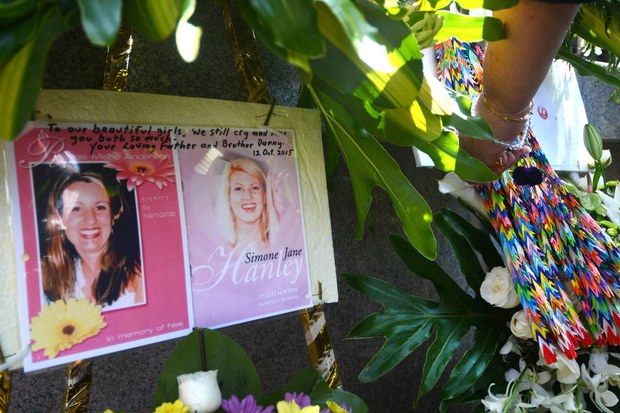Jemaah Islamiyah Re-Emerges as Threat in Indonesia, Think-Tank Says
2017.04.28
Jakarta
 Photographs of two victims are left by visitors at the 2002 Bali bombing memorial in Kuta, Indonesia, Oct. 12, 2015.
Photographs of two victims are left by visitors at the 2002 Bali bombing memorial in Kuta, Indonesia, Oct. 12, 2015.
The Jemaah Islamiyah group that was blamed for the 2002 Bali bombings and other terrorist attacks in Indonesia has re-emerged as a rebuilt organization that could splinter into more militant cells nationwide, a Jakarta-based think-tank says in a new study.
Jemaah Islamiyah (JI) has rebounded in recent years as a newly structured and “hybrid” operation that is trying to use political influence to press for Islamic law in Indonesia and emphasize religious outreach efforts while building up a new military wing, according to the report published this week by the Institute for Policy Analysis of Conflict (IPAC).
JI has transformed itself into a more benign organization under the leadership of Para Wijayanto that does not agree with waging jihad on home soil, but the group still has the potential to rise again as a militant threat, IPAC Director Sidney Jones said.
As she put it, JI can produce radical cadres because JI continues to instill jihadist ideology in their followers with a permanent goal of realizing an Islamic state.
“Don’t look at JI as a dead organization. They can rise again. They still teach salafi jihadi ideology in their lectures,” Jones told BenarNews on Friday.
JI, al-Qaeda’s affiliate in Southeast Asia, was the group notorious for carrying out the bombings that killed 202 people in Bali 15 years ago as well as other deadly attacks in Bali and Jakarta in 2003, 2004, 2005 and 2009. But JI-linked bombings stopped after many of its leaders were arrested and put in prison.
More recent arrests of 18 suspected JI members since 2014, however, have exposed hundreds of members and pointed to the group’s re-emergence on the scene, according to IPAC.
By 2015, IPAC said, police estimated that JI had about 1,000 members, who were each contributing Rp 60,000 (U.S. $5) to the extremist group’s coffers each month.
The new incarnation of JI “is not an immediate threat,” the report says, adding that the group since 2007 “has rejected the use of violence on Indonesian soil and its leadership is strongly opposed to [Islamic State].”
“But the revelations of the 18 JI members arrested since 2014 should still be considered a danger.”
Since 2010, JI has also been trying to rebuild a clandestine military wing while arguing that violence on Indonesian soil is counterproductive, according to IPAC.
“The problem is that JI is recruiting lots of new members on the basis of a salafi jihadi ideology and then telling them they can’t engage in violence,” Jones said in a news release accompanying the report’s publication.
“This is exactly the kind of situation that produces dissent and splintering.”
The IPAC report studied JI’s decline and its rebuilding efforts since 2010 under the leadership of Wijayanto, a longtime member who advocates focus on religious outreach efforts known as dakwah.
“More than a dozen arrests since 2014 have revealed a highly structured operation concentrated on Java but with branches extending into other parts of Indonesia,” the report said. “Much of its energies are focused on above-ground religious outreach efforts … aimed at creating a mass base.”
JI renaissance?
Brig. Gen. Hamidin, who directs Indonesia’s National Counterterrorism Agency (BNPT), who had not yet read the IPAC report, said Friday that authorities were working to closely monitor and shut down suspected militant cells across the country, including JI.
“We continue to monitor and do prevention,” Hamidin told BenarNews.
“We are aware of any changes to the organization,” he said, referring to JI.
Counter-terrorist police unit Densus 88 in recent months has carried out multiple arrests that netted suspected members of Indonesian groups linked with Islamic State (IS). The Middle East-based group claimed responsibility for a terrorist attack that killed eight people, including four assailants, in central Jakarta in January 2016.
Al Chaidar, a terrorism observer from Malikussaleh University in Indonesia’s Aceh province, said JI was likely to survive under Wijayanto because he commands support of JI officials not only in Indonesia but Southeast Asia.
“He is a figure who has been with JI for a long time and his ability is better than others,” Chaidar told BenarNews.
He said JI and al-Qaeda in Southeast Asia have been preparing for this re-emergence and have been eyeing Indonesia as the center of al-Qaeda operations in Southeast Asia.
“It has been prepared for the last two years. The target is to inaugurate it in 2017,” he said.







